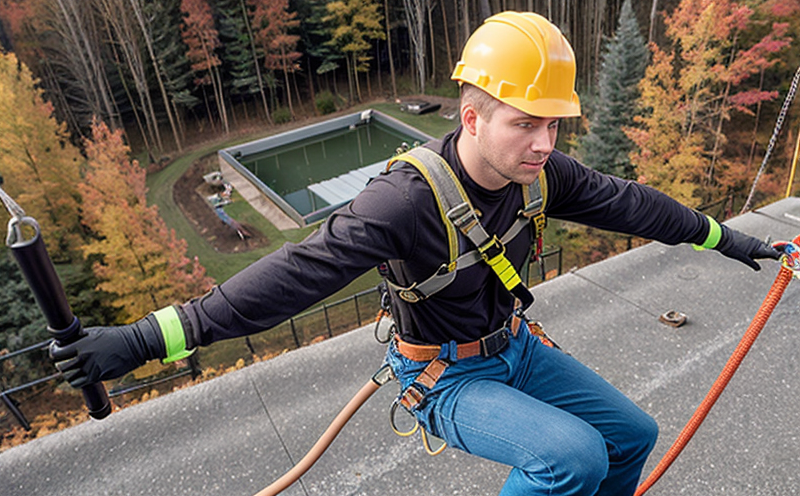ASTM F1772 Full Body Harness Performance Testing
The ASTM F1772 standard provides a comprehensive framework to evaluate the performance of full body harnesses used in fall protection systems. This service is essential for ensuring that these critical safety devices meet stringent requirements set forth by international standards and can withstand real-world conditions. Full body harnesses are designed to protect workers from injury during falls, making their performance evaluation crucial in industries such as construction, manufacturing, and utilities.
The testing process involves subjecting the harness to a series of mechanical and physical tests that simulate realistic fall scenarios. These tests ensure that the harness maintains its integrity under various stress conditions, including loads applied at different angles and positions. The goal is to verify not only the structural soundness but also the comfort and usability of the harness during prolonged use.
During testing, the harness undergoes load testing to determine its maximum load capacity, which is critical for ensuring that it can safely support a worker in case of a fall. Additional tests include impact energy absorption assessment, which measures how effectively the harness absorbs the kinetic energy imparted during a fall. This helps prevent injuries by reducing the force experienced by the person wearing the harness.
The testing protocol also includes environmental factor considerations, such as temperature and humidity, to ensure that the harness performs reliably in all working conditions. Furthermore, tests are conducted to evaluate the harness's resistance to abrasion, chemical exposure, and other potential stresses encountered on job sites. By adhering strictly to ASTM F1772 guidelines, we provide a thorough evaluation of full body harnesses' performance, ensuring they meet or exceed safety standards.
For quality managers and compliance officers, this testing service is indispensable for confirming that fall protection equipment complies with regulatory requirements. R&D engineers benefit from detailed insights into the design improvements needed to enhance product performance. Procurement teams gain assurance that their suppliers adhere to industry best practices. Ultimately, these tests contribute significantly to workplace safety by identifying any potential weaknesses early in the development or manufacturing process.
- Load Testing: Verifies the harness's maximum load capacity under specified conditions.
- Impact Energy Absorption: Measures how effectively the harness absorbs impact energy during a fall.
- Abrasion Resistance: Ensures that the harness can withstand repeated friction without degradation.
- Chemical Exposure Testing: Evaluates the harness's ability to resist damage from common chemicals encountered on job sites.
Applied Standards
The ASTM F1772 standard is widely recognized for its comprehensive approach to evaluating full body harnesses. This standard specifies the performance requirements and test methods necessary for ensuring that these devices are safe and effective in preventing injuries from falls. Compliance with this standard demonstrates a commitment to occupational safety and regulatory adherence.
The ASTM F1772 testing procedure includes several key components designed to assess various aspects of harness performance:
- Load Testing: Determines the maximum load capacity of the harness, ensuring it can safely support a worker in case of a fall.
- Impact Energy Absorption: Measures how effectively the harness absorbs impact energy during a fall, reducing the force experienced by the person wearing it.
- Abrasion Resistance: Ensures that the harness can withstand repeated friction without degradation, which is crucial for prolonged use in harsh environments.
- Chemical Exposure Testing: Evaluates the harness's ability to resist damage from common chemicals encountered on job sites.
The ASTM F1772 standard also includes provisions for environmental testing, such as exposure to temperature and humidity variations, ensuring that the harness maintains its integrity under a wide range of conditions. By adhering strictly to these guidelines, we provide a thorough evaluation of full body harnesses' performance, ensuring they meet or exceed safety standards.
Compliance with ASTM F1772 is mandatory for manufacturers and suppliers who wish to market their products in the United States and internationally. This standard helps ensure that fall protection equipment is reliable and effective, contributing significantly to workplace safety by identifying any potential weaknesses early in the development or manufacturing process.
Why Choose This Test
- Ensures Compliance: Ensures that your fall protection equipment meets international standards like ASTM F1772, which is crucial for regulatory compliance and industry best practices.
- Enhanced Safety: Identifies any potential weaknesses in the design or manufacturing process early on, leading to safer products and reduced risks for workers.
- Improved Product Quality: Provides detailed insights into harness performance under various conditions, enabling continuous improvement of product quality.
- Risk Management: Helps you manage risks associated with fall protection by ensuring that your equipment meets rigorous testing criteria and can be relied upon during critical moments.
Customer Impact and Satisfaction
By choosing ASTM F1772 full body harness performance testing, customers benefit from a service that significantly enhances occupational safety. This ensures that the equipment they use meets or exceeds industry standards, thereby reducing the risk of accidents and injuries on job sites.
The process involves detailed evaluation and reporting, providing customers with comprehensive insights into the performance characteristics of their fall protection gear. This transparency fosters trust between suppliers and users, leading to higher satisfaction levels among clients. Additionally, successful completion of these tests can help companies maintain a positive reputation for safety and quality in their industry.
For industries heavily reliant on fall protection systems, such as construction and manufacturing, this service is particularly valuable. It allows them to stay ahead of changing regulations while ensuring that their workers have the best possible tools available to them. Ultimately, investing in ASTM F1772 testing demonstrates a commitment to worker safety and can lead to long-term business success through improved productivity and reduced insurance costs.





